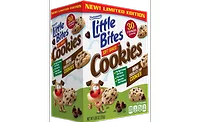FDA Admonishes Bimbo Bakeries for Falsely Listing Allergens on Labels of Products

Image credit: sofi5t via Pixabay
The U.S. Food and Drug Administration (FDA) has sent a warning letter to Bimbo Bakeries USA Inc. for listing “contains” statements for major food allergens on the labels of products that do not actually contain the listed allergens. FDA has asked the company to respond within 15 days of receipt of the warning letter, stating the specific steps it has taken to address any violations and prevent the recurrence of violations, or providing evidence as to why the company believes it is not in violation of the law.
The warning letter follows a statement made by FDA in September 2023 denouncing a trend of food manufacturers attempting to circumvent allergen cross-contamination requirements for sesame (which became the ninth major food allergen under the FASTER Act in January 2023) by intentionally adding the ingredient to formulations and listing it on “may contain” labels, rather than taking the required steps to eliminate the risk of cross-contamination. The statement was accompanied by an updated Guidance For Industry on Hazards Analysis and Risk-Based Preventive Controls for Human Food to include a new chapter on food allergens that helps food facilities avoid allergen cross-contact and ensure proper labeling.
The warning letter was issued to Bimbo Bakeries based on two inspections of the company’s production facilities carried out in late 2023, which found some products to list major allergens in “contains” statements on labels that were not actually present in the product formulations. According to the Federal Food, Drug, and Cosmetic Act, food products must bear truthful and non-misleading labeling; otherwise, they are considered misbranded.
More specifically, FDA found that certain Bimbo ready-to-eat (RTE) bread loaf products—including Sara Lee brand Artesano Brioche, Delightful Multigrain, Artesano Golden Wheat, and Artesano Smooth Multigrain—listed sesame as an ingredient and in their “contains” statements even though there was no sesame in the product formulations. Additionally, at another late-2023 inspection in Topeka, Kansas, FDA found that the company’s Brownberry brand Whole Grains 12 Grains and Seeds RTE bread loaf product listed walnuts, almonds, and hazelnuts in the ingredients and “contains” statements, without those ingredients being in the product formulations.
In light of the warning letter sent to Bimbo Bakeries, FDA is once again emphasizing to food manufacturers that they are required to accurately list ingredients present in their products, and to follow good manufacturing practices (GMPs) and implement appropriate preventive controls to prevent allergen cross-contamination. Labeling is not a substitute for adherence to GMPs or implementation of preventive controls. Instead, firms must comply with applicable requirements to address allergen cross-contact.
FDA recognizes that an advisory statement such as “may contain” could be considered truthful and not misleading in addressing situations where there are low levels of potential unintended allergens present due to cross-contact, despite the use of strong GMPs. However, listing a major food allergen in the ingredient statement or “contains” statement when it is not present in the product formulation does not comply with FDA labeling requirements.
Practices like those admonished in the Bimbo warning letter have been increasingly common since the passage of the Food Allergy Safety, Treatment, Education, and Research Act (FASTER Act), which added sesame to the list of major food allergens. Such practices lead to a decrease in choices for consumers with food allergies. FDA will continue to monitor the situation and will take necessary and appropriate steps to protect consumers with food allergies.
Looking for quick answers on food safety topics?
Try Ask FSM, our new smart AI search tool.
Ask FSM →





